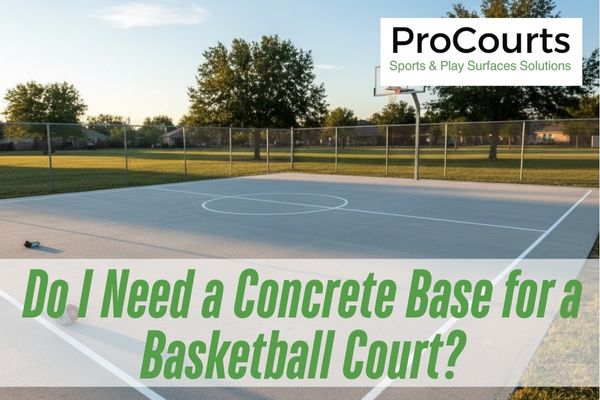
Do I Need a Concrete Base for a Basketball Court?
Why the Base of Your Basketball Court Matters

The base isn't just about what lies beneath it directly affects how the court performs, how long it lasts, and how much maintenance it will require. Without a proper base, you may experience:
Uneven playing surfaces
Cracks and pooling water
Poor ball bounce
Premature surface damage
For more insights into the installation process, visit our Basketball Court Installation Services page.
Common Base Options for Basketball Courts
Concrete Base

Concrete is the most recommended base for residential and commercial basketball courts in Kansas City. It offers excellent durability and performance.
Benefits:
High durability and long lifespan
Consistent bounce and surface stability
Withstands Kansas City's freeze-thaw cycles
Minimal maintenance once installed
Considerations:
Higher upfront cost
Requires proper site preparation and drainage
Asphalt Base

Asphalt is another option, but it doesn't perform as well over time, especially in areas with drastic seasonal changes like Kansas City.
Benefits:
Lower initial cost
Easier and quicker installation
Drawbacks:
Prone to cracking and softening in summer heat
Requires more frequent resurfacing
Compacted Stone Base
A compacted crushed stone base can be used for budget or temporary court setups, often under modular sports tiles.
Benefits:
Cost-effective
Easy to install and remove
Drawbacks:
Less stability
Poor bounce and ball control
Not suitable for long-term courts
For portable or DIY setups, check out Sport Court’s article on modular sport surface installation, which can be paired with non-concrete bases.
Kansas City Weather and Why Concrete Works Best
Kansas City experiences hot summers, cold winters, and a fair share of rain and snow. These weather conditions can wreak havoc on less durable court bases. Concrete, when properly installed, handles expansion, contraction, and moisture without cracking or degrading.
For homeowners looking to build an outdoor basketball court that lasts for decades, concrete is the preferred foundation.
To see real-world examples in the area, visit our Gallery of Completed Courts.
Site Preparation: The Key to a Long-Lasting Court
Even the best concrete base won't perform well without proper site preparation. Here's what a quality prep job includes:
Grading the site to ensure proper drainage
Laying a gravel sub-base for stability
Pouring a minimum 4-inch reinforced concrete slab
Including control joints to reduce cracking
These steps are part of our full-service approach at Pro Courts. Learn more on our Court Construction Services page.
When Can You Skip the Concrete?
There are a few situations where a concrete base might not be required:
Temporary or seasonal courts using portable tiles
Indoor gym setups where the floor already meets specs
Budget builds that prioritize short-term use over longevity
However, these setups typically compromise bounce quality and long-term durability. If you're unsure, our Free Estimate & Consultation will help you choose the best approach for your space and budget.
Estimated Cost of a Concrete Base in Kansas City
The cost of installing a concrete base depends on factors such as site conditions, size, and thickness. On average:
Residential concrete base: $5 to $10 per square foot
Commercial projects: May vary based on access and grading needs
For a precise quote, reach out through our Free Estimate Form.
Benefits of Choosing Pro Courts in Kansas City

"Installed basketball court project by pro courts"
Choosing a local expert makes all the difference. Pro Courts specializes in basketball court installation and is familiar with Kansas City soil conditions, drainage requirements, and permitting processes.
Why clients trust us:
Custom court layouts to fit your space
Experience with residential and commercial projects
Knowledge of local zoning and weather challenges
Use of premium materials and professional equipment
Explore our services for Commercial Basketball Courts and Backyard Sports Courts.
Frequently Asked Questions
Is concrete always required for a basketball court?
No, but it is highly recommended for long-term outdoor courts, especially in climates like Kansas City.
How thick should the concrete be?
At least 4 inches with reinforcement. Some commercial setups may require 5–6 inches.
Can modular tiles be installed over concrete?
Yes. In fact, many clients choose this combo for the best balance of performance and maintenance.
What if my backyard isn't level?
Pro Courts handles all grading and prep work as part of the installation process.
Ready to Build Your Basketball Court?
If you’re serious about creating a durable, professional-looking basketball court in Kansas City, a concrete base is a smart investment. It's the foundation that ensures performance, safety, and value for years to come.
Contact Pro Courts today to schedule your free on-site estimate and explore your court options.
Visit Pro Courts Kansas City or call us directly for more information.


